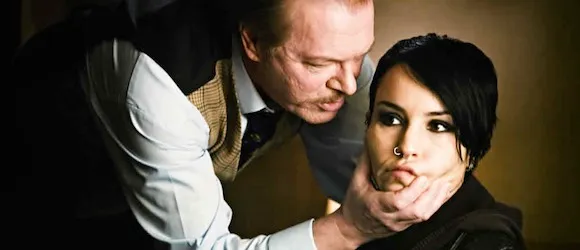Normally, when ad executives worry about women not responding to violence in movies, we scoff and write a post about how narrow minded they’re being, and feel free to use our own community as an example of women who would totally go see a movie that began with “John Carter” even if it ended with “of Mars.” Especially if it ended with “of Mars.” But when the ad folk behind American adaptation of The Girl With the Dragon Tattoo say they’re concerned that their movie is too full of sexual violence to appeal to women, I’m gonna say: Yeah. You might be right.
According to Vulture, this is a big concern:
To date, Knopf’s Vintage Books has sold 18 million copies of The Millennium Trilogy in all formats (with 1.3 million more paperback copies of The Girl with the Dragon Tattoo being shipped as a movie tie-in). While a Vintage spokesman, Russell Perreault, said that the imprint could not furnish Vulture with demographic data about what percent of the Dragon Tattoo readership was female, he did note that on the publishing house’s official Dragon Tattoo Facebook page, 71% of the 469,000 fans were women. He also noted that on Knopf’s official Stieg Larsson Facebook author fan page, some 65 percent of the author’s 291,000 fans of the author were female.
And yet those female fans seem to be backing away from [David] Fincher‘s dark film adaptation, which has so far been racking up stellar reviews. The movie is hardly tracking to be a bomb; the issue is more that by scaring off women, it could be leaving money on the table, or at least in purses and handbags. “It has had a problem with women since it came on tracking,” says one former studio marketing chief, referring to audience polling conducted by Nielsen Media’s National Research Group. This exec says Sony is concerned that while women are more aware of Fincher’s movie than men, they are almost no more likely to want to see it: Fully 83% of women over 25 and 79% of women under 25 are aware of the film, but only 36% of either group of women expressed “definite interest” in seeing it. Men are about five percentage points lower in awareness in both demos, and yet at about the same percentage of definite interest.
Fincher’s The Social Network caught a bunch of flak, even from Stephen Colbert, about its treatment of its female characters, and he’s made no bones about seeking to please with Dragon Tattoo.
After the success of The Social Network, the director got final cut of this movie and has an outsized influence on its marketing materials, and he seemingly had no interest in hunting down a mass audience… To be sure, the marketing of the film reflects Fincher’s asocial sensibilities: Gray-on-gray posters of the mohawked femme courageux, Lisbeth Salander. A quick-cutting trailer that’s so hip, it barely bothers to name the film it was teasing. Dour TV commercials that, as one insider put it, “do not say, ‘Come, all ye who have read this book!’”
Our own Jamie offered this candid quote for me on why she’s decided not to see the movie, having watched the Swedish film adaptation:
I watched the original movie, and it wasn’t a bad movie, but I’m not going to pay money and leave my house to volunteer to feel that uncomfortable. But that’s just me. I wouldn’t tell other women not to see it because of that, though they should know that there’s a horrible rape scene in it. Also, from what I can tell, [Fincher’s] version might be more graphic. For example, in the original, you see Lisbeth limping away afterwards. In the Fincher version, you see her bleeding in the shower. So, yeah. No thanks.
If the book is popular with women, but the same story presented in film isn’t, it’s probably because you’re doing something different. Maybe, your depiction of violence against women is being interpreted as voyeuristic, as sexed up, or simply as a presentation of sexual violence as attractive (whether aesthetically attractive, sexually attractive, visually attractive, thematically attractive, or whatever). Needless to say, “attractive” should never be the way that sexual violence against anyone is purposefully depicted. That’s not necessarily my accusation (that this attitude was purposeful), and I certainly wouldn’t consider myself an expert in the PR for The Girl With the Dragon Tattoo, but purpose may not have had anything to do with it.
It’s simply very difficult to present sexual violence on the screen (whether or not it’s “realistic” or “graphic”) in a way that isn’t going to make many women uncomfortable, and it’s what you do with that discomfort; whether it’s left to linger, given proper closure, or glossed over by the narrative; that will ultimately redeem or damn your handling of the issue. Even if you’ve read the book, we all know adaptations can be unfaithful or strike a different tone than the source material. Whether a movie will have that resolution, or not, is near-impossible for an audience to figure out from trailers or advertising unless the campaign is explicit about it, and it’s that uncertainty that I would say is likely to be alienating people.
What do you guys think of the movie? It’s publicity? The book? The original movie?








Published: Dec 14, 2011 11:48 am